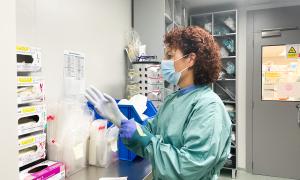CPC mouthwashes reduce herpes simplex type 1 infectivity herpes simplex type 1 infectivity

CPC-containing mouthwashes could be a safe, easy and cost-effective measure to limit infectivity and the ability to transmit viruses
An in vitro study carried out by the IrsiCaixa AIDS Research Institute –a centre jointly promoted by the "la Caixa" Foundation and the Department of Health of the Generalitat de Catalunya– and the Dentaid Research Center has concluded that the use of mouthwashes containing cetylpyridinium chloride (CPC) can reduce, in cell cultures, up to 100 times the infection capacity of herpes simplex type 1 (HSV-1). CPC thus plays an important role as an antiviral, as well as being effective as an oral antiseptic. The study, published in the scientific journal Viruses, reaffirms the ability of CPC to reduce the infectivity of certain viruses, given that the compound had already demonstrated, in previous in vitro and in vivo studies, its effectiveness against viruses such as influenza and SARS-CoV-2.
The oral cavity is particularly susceptible to viral infections, especially since it is the main gateway for a multitude of pathogens to enter the body. "The in vitro experiments carried out in this study suggest that mouthwashes with CPC could be effective as viricide agents against viruses that cause oral infections, such as the herpes simplex virus (HSV-1)," says Dr. Manuel Bañó, researcher at the Dentaid Research Center.
For this study, mouthwash containing CPC has been added to a culture of herpes viruses. Two minutes later –the time equivalent to the duration of a mouthwash– the CPC was removed from the viral culture and the viruses were brought into contact with a human cell culture. "We tried to simulate a mouthwash situation, but in the lab. Thus, we have seen that the virus that has been in contact with the CPC loses the ability to infect the cells. On the other hand, if we do the same experiment, but without CPC, the virus continues to infect the cells," explains Dr. Ester Ballana-Guix, principal investigator at IrsiCaixa.
Specifically, the trial has been carried out with two mouthwash solutions, one for daily care with a concentration of 0.07% CPC, and another for temporary use for the adjuvant treatment of periodontal and peri-implant diseases, with a concentration of 0.05% CPC. In both situations, it has been confirmed that this component is able to reduce the infectivity of the herpes virus, in the same way as was demonstrated in the case of COVID-19 virus. "Although clinical trials are needed to evaluate the protective role of CPC in humans, we know that limiting the viral load in the oral cavity is important, not only to limit reinfection and prevent complications in cases of severe infection, but also to reduce the oral transmission of viruses," Ballana says.
Therefore, oral rinses with mouthwashes containing this component could be an easy, affordable and safe additional tool to reduce the infectivity of highly prevalent viruses such as herpes.
Herpes simplex virus type 1
According to the World Health Organisation (WHO), an estimated 3.7 billion people under the age of 50 worldwide are infected with HSV-1. HSV-1 is a virus that is mostly spread through oral contact and causes infections such as sores or rashes in the mouth and adjacent areas. Most people with HSV-1 have no symptoms or only mild symptoms, which means that they can transmit the virus to others without being aware of it.